The Department of English is an exciting place to study digital humanities. Our approach is shaped by the department’s commitment to imaginative reasoning, blending cutting-edge classroom-based instruction with experiential learning opportunities for students of all levels. Imaginative reasoning helps us “re-frame how we look at the world” in a critical way. We are also engaged in the department’s focus on social justice and anti-racist action, studying questions of race, gender, sexuality, and economics in our classrooms and research projects.
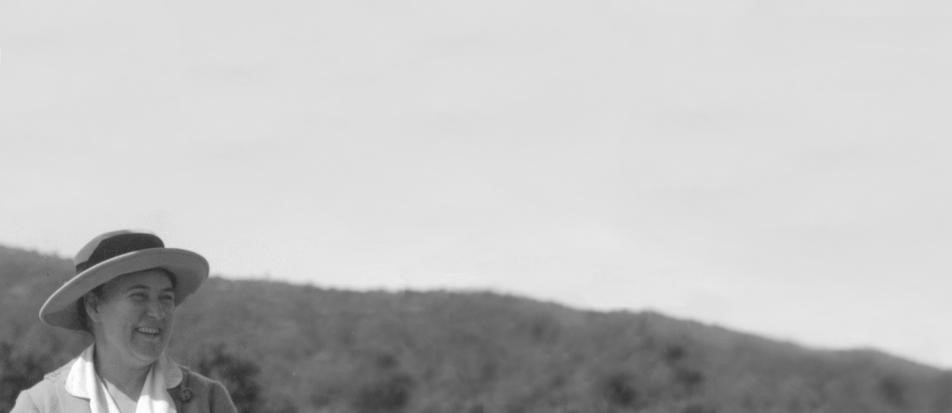
Digital approaches to literature reframe the way we have traditionally seen, understood, analyzed, published, and preserved our cultural heritage. Scholarship in digital humanities, for example, tends to be collaborative rather than solitary in nature. The team-oriented approach means that questions larger than any one person could undertake can be addressed. And because many projects are web-based, the public is invited into the creation or reconsideration of cultural knowledge through our scholarly efforts.
The Department is home to a range of cutting-edge digital work. Students in our department are immersed in digital archive building, computational text analysis, and textual scholarship to explore questions central to the study of literature across history and continents. Our composition and rhetoric faculty have expertise in digital writing environments and digital rhetoric. And our close relationship with the internationally recognized Center for Digital Research in the Humanities (CDRH) allows students to engage in exciting Center-sponsored activities and to get a first-hand experience of complex digital humanities project development.
We encourage you to jump into an exciting world where code grapples with art and faculty and students work together to create digital archives out of the materials of poets, scholars, journalists, explorers, and novelists. For more on DH in the Department of English, contact the current department DH coordinator, Stephen Ramsay, at sramsay2@unl.edu.
DH Program Alumni
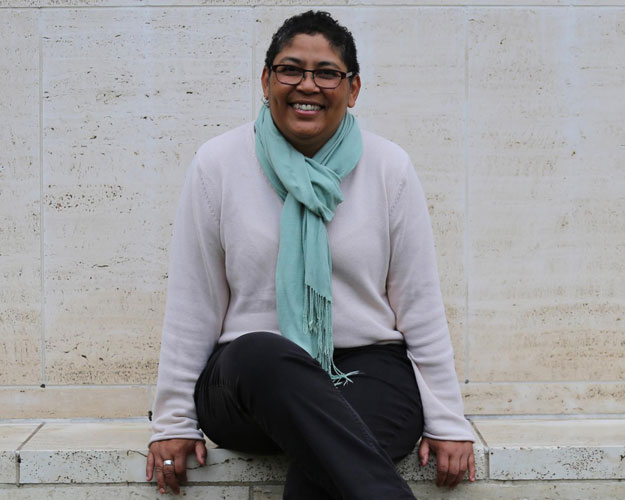
Linda Garcia Merchant
Ph.D. 2020, UNL English
US Latino Digital Humanities Post Doctoral Fellow, University of Houston
“DH technology-based courses have given me opportunities to learn and apply text analysis and interpretation applications. Collaborative courses have provided project development and management opportunities to developing project proposals and work with the non profit community to create sustainable products and processes.
“As a 2017 Digital Scholar Incubator (DSI) Fellow, I was able to craft an Omeka collection site and a Scalar multi-media site for the case study I am using for my dissertation. The time as a DSI, along with the exercises in ideation critical to the creative process, created a unique combination of time and space for intense interpretive experimentation and critique, now reflected in the rich and varied narrative of final Scalar site production.
“Finally, I am a multi-modal scholar and teacher because I have implemented much of the technology and collaborative processes I learned through my DH courses. I integrate organic pedagogy with available technologies to provide my composition and rhetoric students a platform of new and exciting ways to explore and articulate complex ideas and texts. The methodologies DH offers continues to shorten the distance between the ways I can successfully construct and explore narrative ideas in the classroom and in my own scholarship.”
DH Student Spotlight
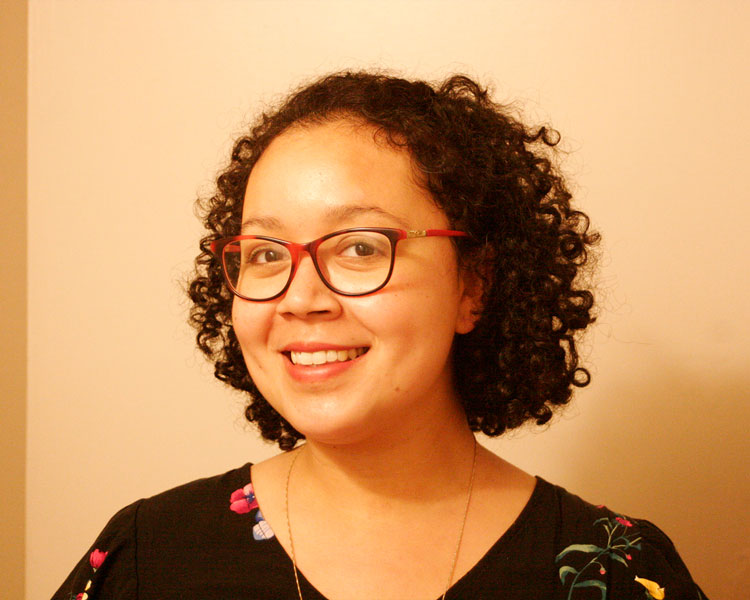
Claire Jimenez
Ph.D. Student, Department of English
Claire Jiménez is a Puerto Rican writer who grew up in Brooklyn and Staten Island, New York. She is the author of Staten Island Stories (Johns Hopkins University Press), which received a NYC Book Award from the New York Society Library and was a finalist for the International Latino Book Awards. Jiménez is a PhD student in English, pursuing certificates in ethnic studies and digital humanities at the University of Nebraska–Lincoln, where she is also an assistant fiction editor for Prairie Schooner. She is a graduate of the MFA program in Fiction at Vanderbilt University. In 2020, she received a Mellon Foundation grant from the U.S Latino Digital Humanities Program at the University of Houston to work with a team of scholars to develop a digital archive of Puerto Rican literature that she had begun as a Summer fellow at the Center for Puerto Rican Studies at Hunter College. With the help of USLDH, this project was later awarded the Andrew W. Mellon Foundation Presidential Initiatives Grant, for which Jiménez is a Co-Principal Investigator. Her fiction, essays, and reviews have appeared in Remezcla, Afro-Hispanic Review, PANK, The Rumpus, el roommate, and Eater, among other publications.
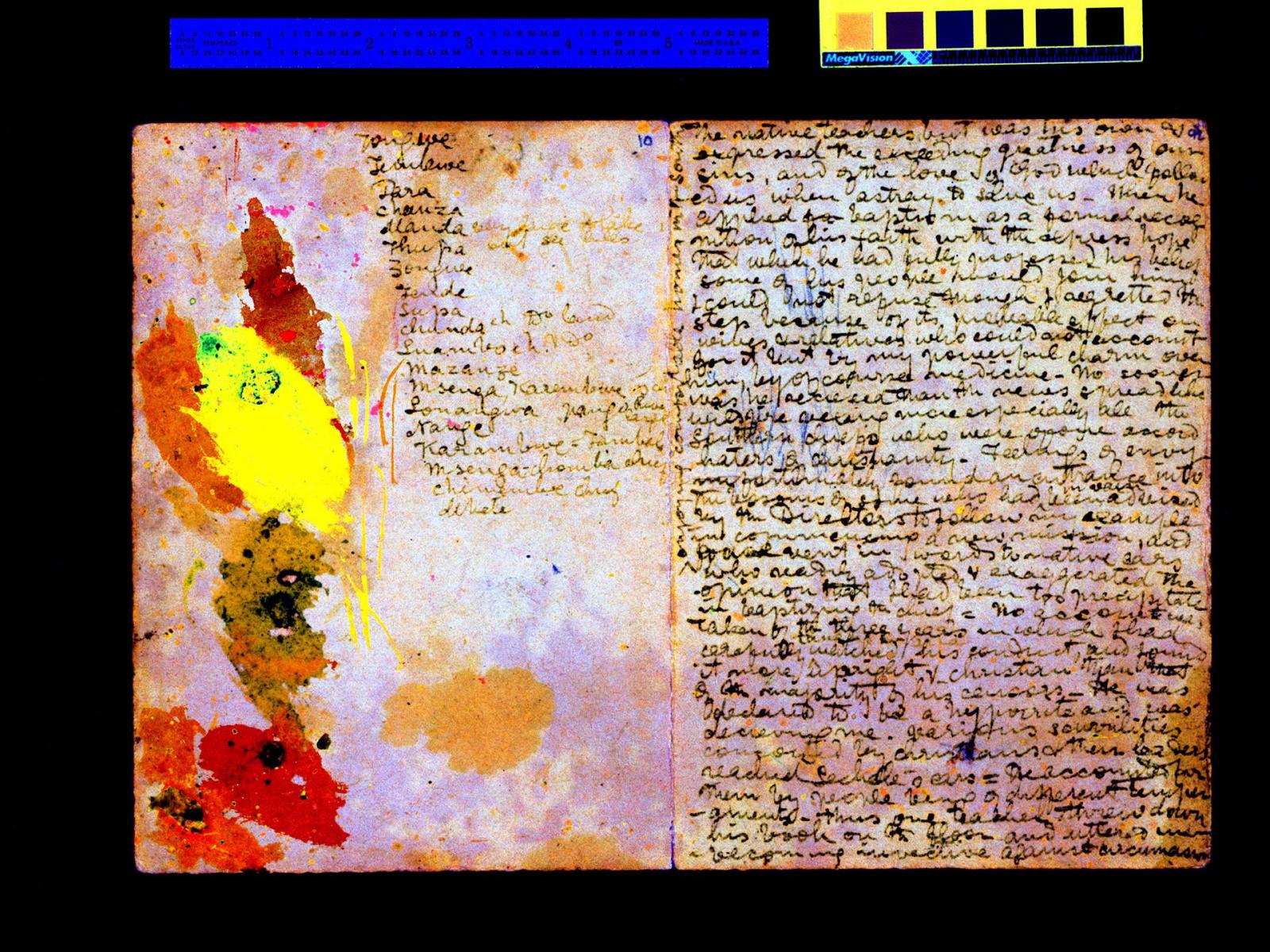
"In our DH classrooms and in collaborative project settings, students can study a vast range of subjects: from the most innovative DH theories and technologies such as spectral imaging and text analysis to the nuts and bolts of grant writing and site development."
Adrian S. Wisnicki, Associate Professor
Course Offerings
Being Human in the Digital Age (ENGL 277)
Introduction to Digital Humanities (ENGL 278)
Digital Literary Analysis (ENGL 279)
Sample section: “Development and Design”
Literary Studies in the Digital Age (ENGL 378)
Sample section: "Romantics, Victorians, and the Impact of the Digital Humanities"
Reading Technologies from Antiquity to the Digital Age (ENGL 379)
The Culture of Surveillance (ENGL 395)
Digital Humanities Practicum (ENGL 472/872)
Advanced Topics in the Digital Humanities (ENGL 477/877)
Digital Archives and Editions (ENGL 478/878)
Interdisciplinary Readings in the Digital Humanities (ENGL 946)
Department Projects
Ardhi Intiative: An Africana Digital Humanities Project
Austen Said: Patterns of Diction in Jane Austen's Major Novels
The Charles W. Chesnutt Archive
Livingstone Online: Illuminating Imperial Exploration
The Tar Baby and the Tomahawk: Race and Ethnic Images in American Children's Literature, 1880-1939
Trans-Mississippi & International Exposition

"We teach students to think about digital media within the larger context of the social, political, and intellectual history of technology. Our students pursue digital projects and careers equipped with an understanding of how their work shapes culture."
Amanda Gailey, Associate Professor
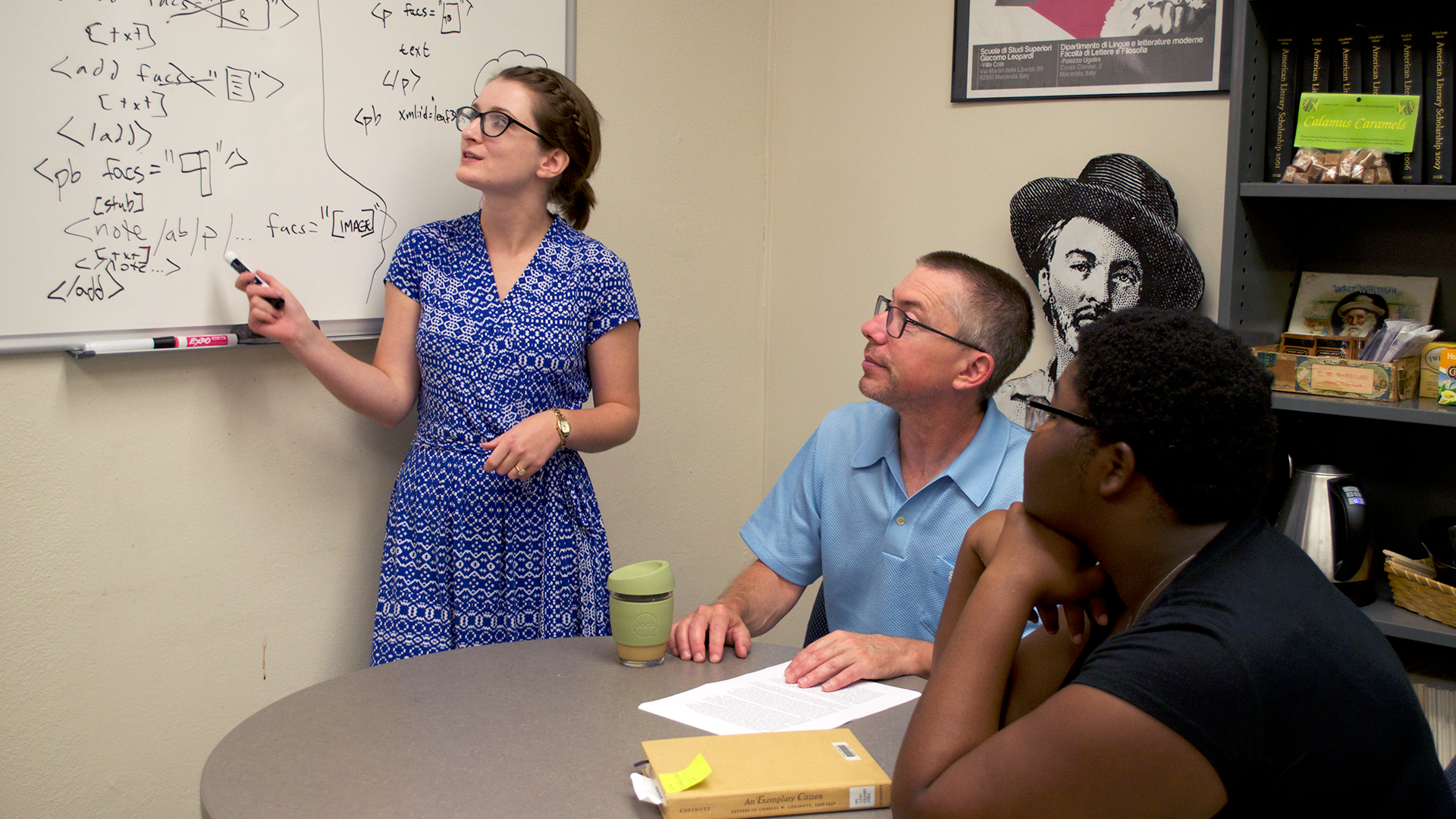
"Our digital humanities students aren't just doing projects—they're inventing them and leading them. We are helping Nebraska's students bring creativity to code, so that they can be innovators in an ever-shifting electronic world."
Matt Cohen, Professor of English and Contributing Editor, Walt Whitman Archive
Key Opportunities at the University of Nebraska-Lincoln
Center for Digital Research in the Humanities (CDRH)
Digital humanities faculty and students in the Department of English work closely with the university's distinguished Center for Digital Research in the Humanities (CDRH). Without the staff and resources of the Center, which is a joint initiative of the University Libraries and the College of Arts & Sciences, most of the Department of English projects listed above would not have been possible. The Center works with scholars and departments across the university, sponsors various activities related to digital humanities practice, and offers undergraduate and graduate students the opportunity to hone their technical skills while taking part in cutting edge digital humanities research. For more on the Center, contact its co-directors Andrew Jewell at ajewell2@unl.edu and Kenneth Price at kprice2@unl.edu.
Nebraska Forum on Digital Humanities
The Nebraska Forum on Digital Humanities is an annual thematic exploration of issues in Digital Humanities. Sponsored by the Center for Digital Research in the Humanities and bringing speakers from institutions around the world, the Forum has been organized around topics like Social Justice and Cultural Memory, Video Games and the Humanities, and Digital Cultural Heritage.
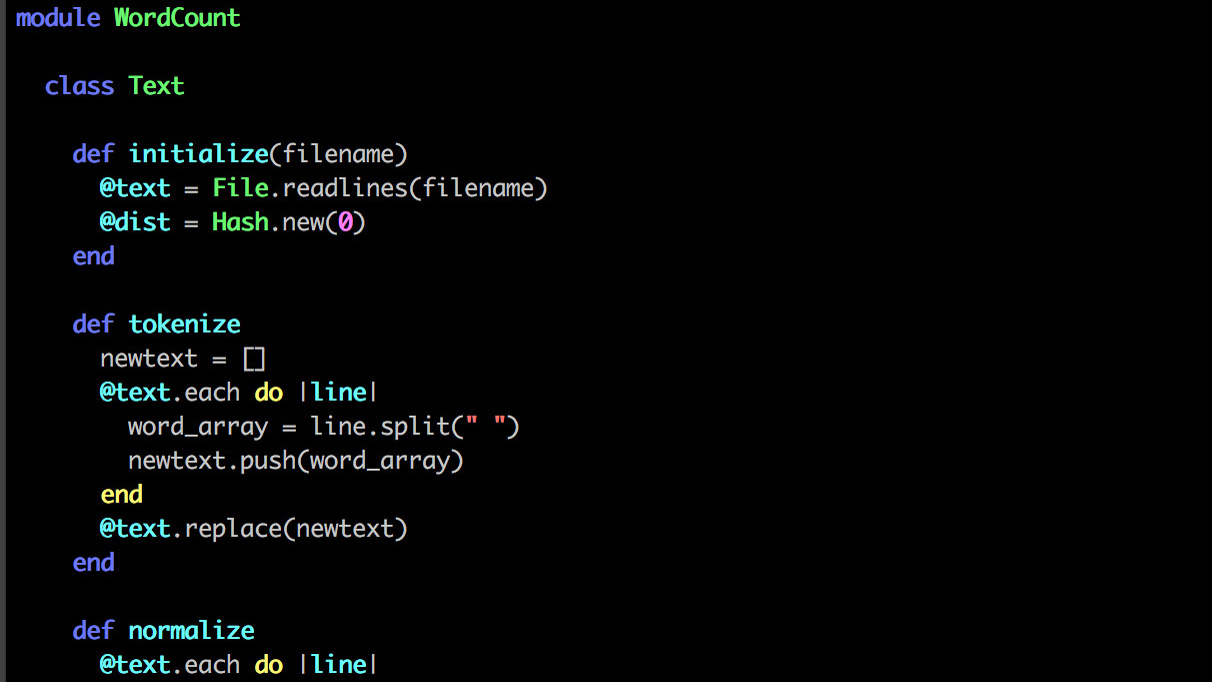
"We offer students the opportunity to study the type of writing that underlies nearly all new media forms: namely, programming."
Stephen Ramsay, Associate Professor of English
Graduate Certificate in Digital Humanities
The Graduate Certificate Program in Digital Humanities allows graduate and post-baccalaureate students to gain scholarly credentials in Digital Humanities. Work in this area can take a variety of forms, including: digital scholarly editing; the creation of thematic research archives and resources; programmatic analysis of large-scale textual corpora; the use of geo-spatial tools and technologies to study the interaction of people and place; data mining and machine learning techniques using historical data; 3D modeling of historical buildings and artifacts; tool building and software development for humanities research; and the creation of games, interactive environments, and media systems with a humanistic focus.
English Major Concentration
Undergraduate English majors design their own concentration - a program of study based on their areas of interest, organized around a controlling theme or topic. Majors can design a concentration in digital humanities by meeting with their advisor.
The Undergraduate Minor
The minor in digital humanities offers a wide range of courses that allow students to explore how digital technologies alter our understanding of ourselves, our art, our history, and our culture. Students learn how to critically engage with digital media, and many courses introduce students to digital techniques for research, analysis, and publication. Each student gains experience with hands-on, creative digital work, and several courses provide students opportunities to conceive and build digital projects independently and with teams of other students. The range of electives available for the digital humanities minor, combined with frequent special topics courses that can easily be substituted in, means that students can find distinctive groups of courses that speak to their interests in literature, history, archeology, classics, art history, 3D modeling, text analysis, digital archives, and more. Graduates with a digital humanities minor are well prepared for a growing number of careers in industry, nonprofit, and educational sectors that welcome digital skills alongside the communication and critical thinking abilities that have long been valued in humanities students. Students have also gone on to pursue graduate work in the humanities, library science, and information science, among other disciplines.
"The students I work with on the Whitman Archive have reshaped our understanding of a cultural icon. I’m proud of their achievements—including new discoveries, published articles, NEH grants, and both alt-ac jobs and tenure-line professorships."
Kenneth M. Price, Hillegass University Professor of American Literature
Digital Humanities Faculty
Brett Barney is a research associate professor in the Center for Digital Research in the Humanities and has been involved in the creation and maintenance of the Walt Whitman Archive since 2000. He served two terms on the technical council of the Text Encoding Initiative and is especially interested in encoding protocols that support the creation of documentary editions and the identification of various, complex relationships among documents and parts of documents.
Matt Cohen is a contributing editor at the Walt Whitman Archive, where his projects include digitizing Whitman’s marginal annotations, building a visualizable handlist of reprints of Whitman’s poetry, and improving access to translations of Whitman’s work. That work informed his book Whitman’s Drift: Imagining Literary Distribution (University of Iowa Press, 2017). He is also a co-editor of the Charles W. Chesnutt Archive.
Editor and writer Kwame Dawes is the editor of Prairie Schooner and the founder and director of the African Poetry Book Fund, the home of the African Poetry Digital Portal and several African poetry book series. Dawes’s scholarship is in post-colonial studies, African literature, Caribbean literature, and African American Literature. He won an Emmy for new approaches to news and documentary programming for LiveHopeLove.com, and has received grants from the Ford Foundation and the Mellon Foundation for digital humanities projects.
Amanda Gailey’s research and teaching interests include nineteenth-century American literature, digital editing, and the sociopolitical implications of technology.
Andy Jewell is the director of the Willa Cather Archive, a large online archive and publisher of digital resources relating to the American author (like the Complete Letters of Willa Cather, debuting in January 2018). After years of experience creating a digital research collection, he seeks to explore connections between his DH work and public humanities programming, likely through new forms like community events and short films.
Elizabeth Lorang co-directs Image Analysis for Archival Discovery, a cross-disciplinary, multi-institution project that seeks to leverage the information potential of digital images to enhance discovery and access to historic materials. She is also the co-editor of a digital edition of newspaper poetry from the Anglo-African and National Anti-Slavery Standard.
Kenneth M. Price co-directs the Walt Whitman Archive and Civil War Washington. With Ray Siemens, Elizabeth Lorang, and Dene Grigar, he co-edits Literary Studies in the Digital Age: An Evolving Anthology, the Modern Language Association’s first online only publication.
Ng’ang’a Wahu-Mũchiri teaches African and African Diaspora Literatures, as well as a course titled “Global Anti-Racism Movements from the Civil Rights Era to Now.” The class empowers students to ask profound, interesting, and creative questions that advance our understanding of social justice, activism, and literature’s role in political movements. His research in representations of African land is the subject of a current monograph project titled Land & Landscape in Literature from Eastern & Southern Africa. His contributions to edited anthologies include: “Depictions of Kenyan Lands & Landscapes by Four Women Writers” in the 2019 Routledge Handbook of African Literature. The Ardhi Initiative is an ongoing digital humanities project that encodes and curates colonial land treaties between European nations and African political entities.
Stephen Ramsay splits his time between pontificating about digital humanities, teaching humanities majors to program, designing and building text technologies for humanist scholars, and composing music using computers. He is the author of Reading Machines: Toward an Algorithmic Criticism (University of Illinois Press, 2011) and (with Patrick Juola) Six Septembers: Mathematics for the Humanist (Zea E-Books, 2017).
Adrian S. Wisnicki is interested in applying advanced imaging to manuscript study and developing digital archives and museums. He directs both Livingstone Online and the Livingstone Spectral Imaging Project, two collaborative international projects funded by the National Endowment for the Humanities. "He directs both Livingstone Online and the Livingstone Spectral Imaging Project, two collaborative international projects funded by the National Endowment for the Humanities. He is also lead developer for One More Voice, a DH project that focuses on recovering non-European contributions from nineteenth-century British imperial and colonial archives, and co-organizer of Undisciplining the Victorian Classroom, a DH project that reimagines how to teach Victorian Studies through a positive, race-conscious lens.